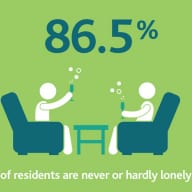Older people in retirement communities less likely to fall, research finds
[ad_1]

Older people are less anxious, more active and less likely to fall in retirement communities, research has found.
The study by Aston and Lancaster Universities, commissioned by the ExtraCare Charitable Trust, said the physical and mental benefits of living in retirement communities resulted in cost savings for the NHS.
The ExtraCare Charitable Trust’s Chair of the Board of Trustees, Paul Jennings, said: “This is great news for our residents; our unique approach really is resulting in positive measurable outcomes for healthy ageing. One of the lessons we can take from the study is by helping residents to improve their physical fitness, we can also improve their psychological well-being.”
Findings showed that residents in retirement communities were more physically active (75% increase in exercise); benefited from a reduced risk of falls (18%); were less anxious (23%); had an increased walking speed; were ‘never or hardly ever’ lonely (86.5%); had improved autobiographical (24%) and memory (17%) recall; and could delay or reverse the onset of frailty.
The study led by Professor Carol Holland included additional measures for loneliness, resilience and quality of life, and showed that ExtraCare’s unique well-being and lifestyle model delivered significant health improvements, including residents reducing their average hospital stays by three days per year.
Shirley Hall, Head of Innovation and Well-being at The ExtraCare Charitable Trust, said: “We’re excited by the results of our study, we know older people who exercise tend to be happier and are likely to live longer healthier lives, so it’s great to see that residents within our communities are more physically active.
“However, the results do show a small number of residents are feeling lonely, so we need to help identify and support those who are. We know from the study that working on autobiographical memory is one area that our residents can work on to help improve ‘social connectedness’ and loneliness further, and supporting residents with mobility issues to build resilient social networks will be critical in reducing their level of loneliness over time, all things that the charity is committed to doing.”
The post Older people in retirement communities less likely to fall, research finds appeared first on Care Home Professional.
[ad_2]
Source link

